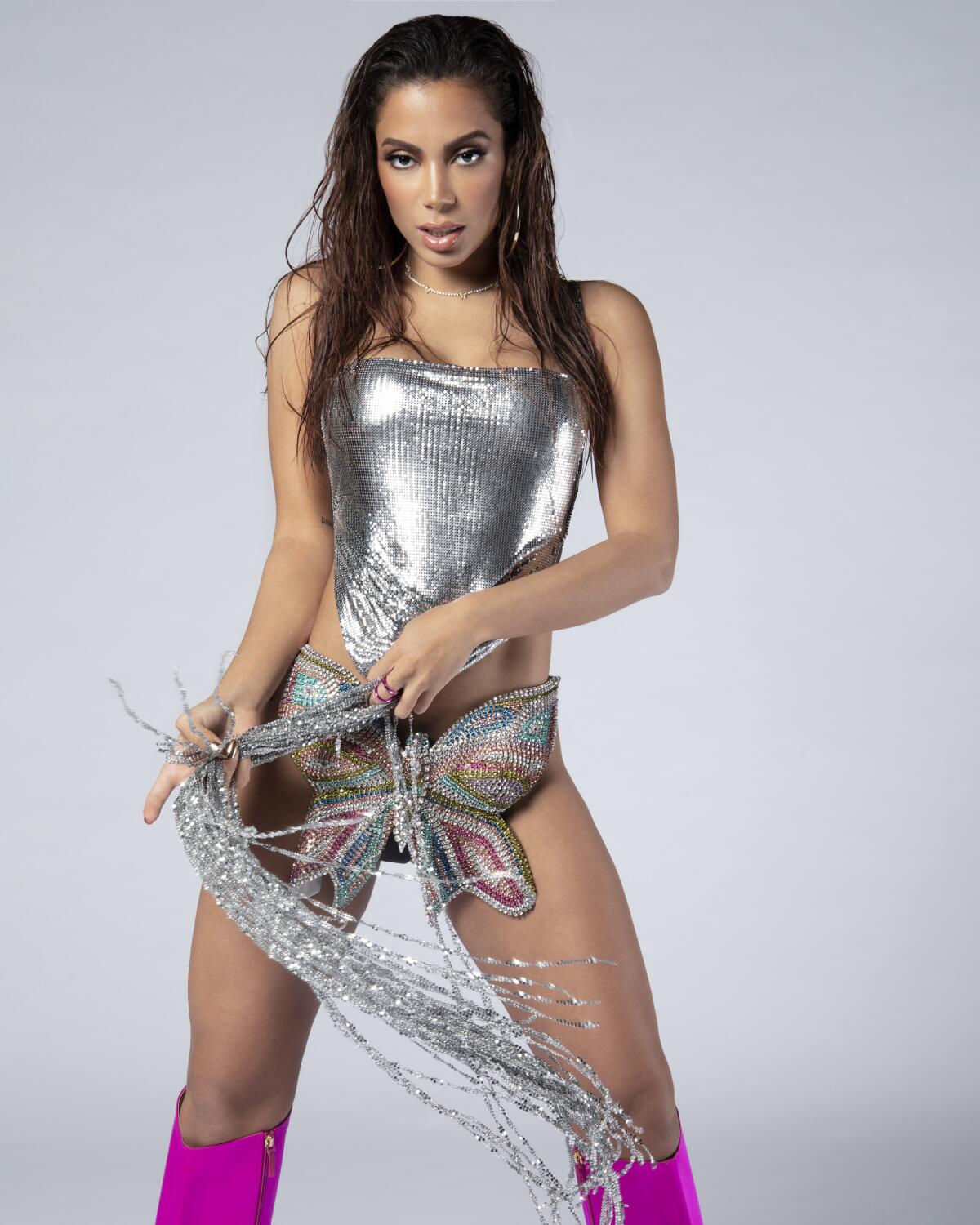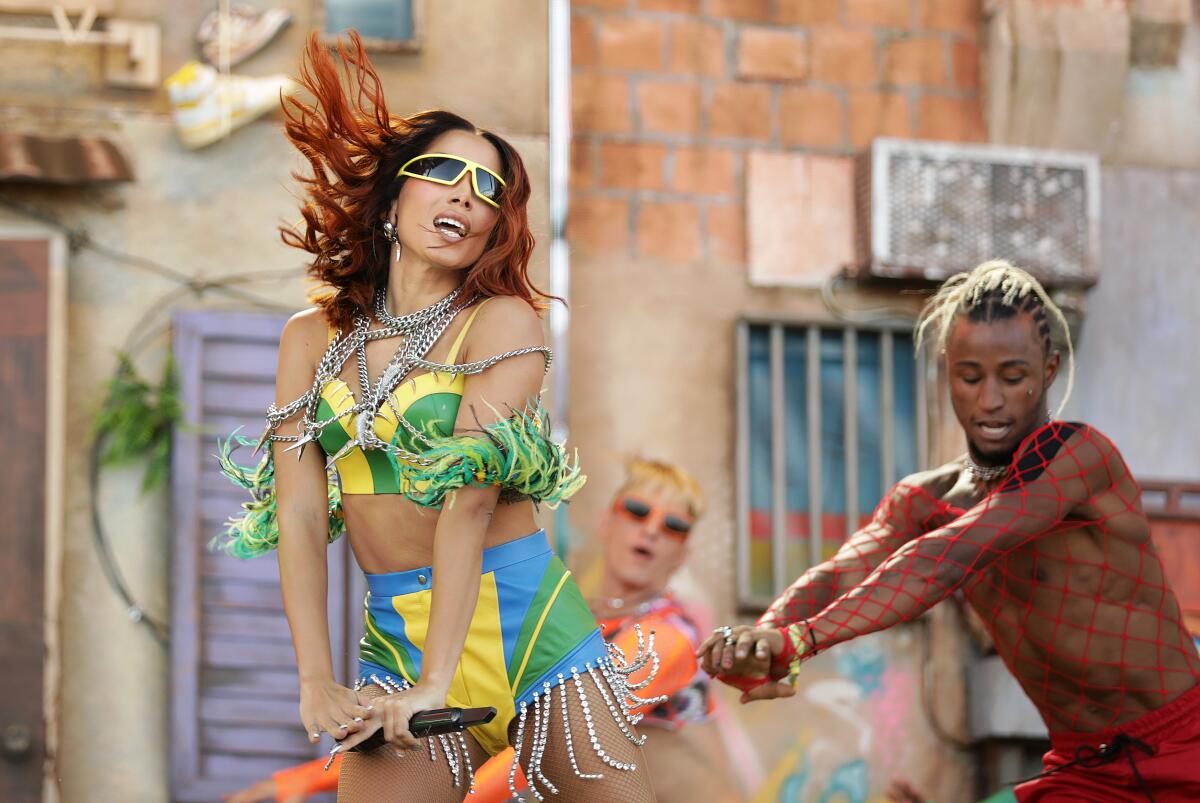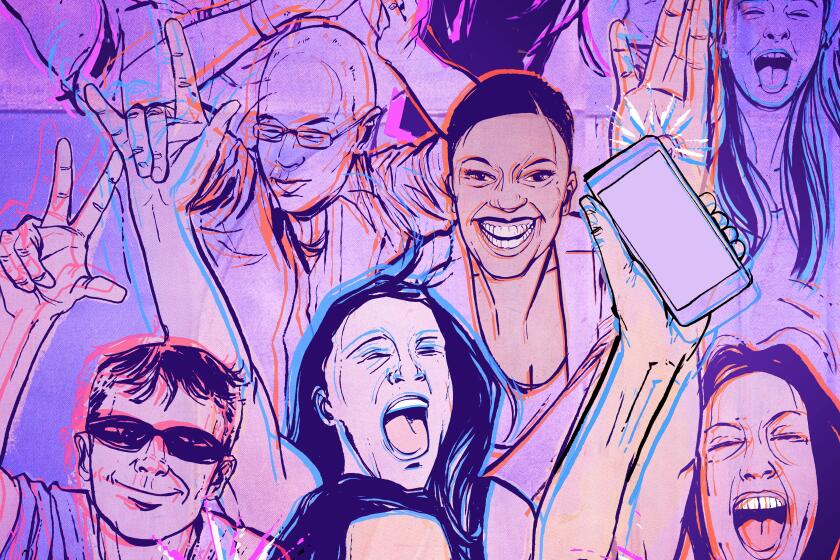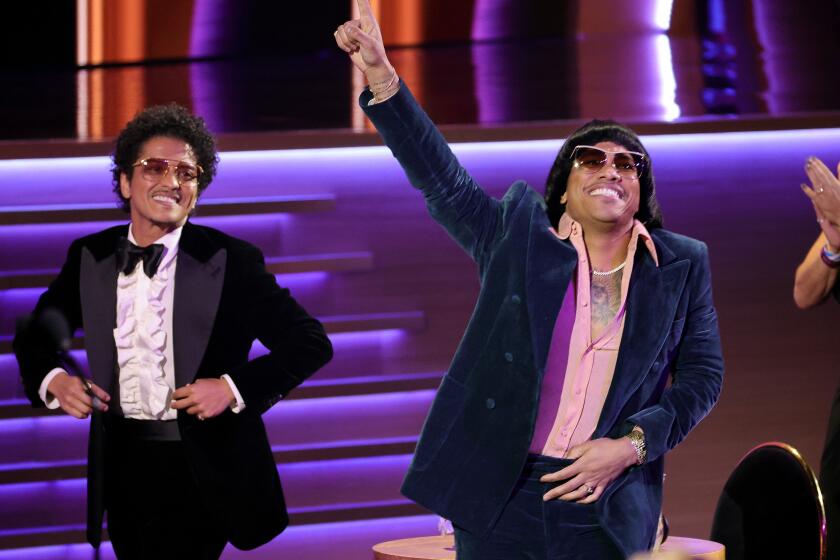Brazil’s Anitta is already a global phenom and LGBTQ icon. Now she’s set to conquer America

- Share via
Brazilian pop star Anitta has been coming out of the closet since she was 14.
“I kissed a girl before I kissed a guy,” she says, calling from backstage at the Coca-Cola Music Hall in Puerto Rico, where she will join reggaeton singer-songwriter Justin Quiles onstage. “I only told my mom after I kissed a guy, because ... I didn’t know how to feel. I thought there was something wrong with me for wanting to kiss a guy and a girl. But my mom just said, ‘So what?’ ”
Ten years and many boyfriends later — “I change boyfriends like I change panties,” she often jokes — Anitta came out to the world as bisexual in her 2018 Netflix docuseries, “Vai Anitta.” Although she initially felt reluctant to discuss what she describes as casual relationships with women in the past, Anitta opened up after a stranger covertly snapped photos of her kissing a woman at a party.
“My family never had an issue, but everyone else needed an answer about it,” she explains. “So I said, ‘I don’t want to be hiding.’ If I go to the club and I want to kiss a girl, I don’t want to be scared of people seeing me and freaking out.”
On Saturday, Anitta will join Christina Aguilera as one of the headliners of L.A.’s annual Pride in the Park, an outdoor concert and celebration of the city’s LGBTQ community, located in the Los Angeles State Historic Park.
The all-day affair will include performances by Syd, Rebecca Black, Chika and “RuPaul’s Drag Race” winner Bob the Drag Queen.

Anitta’s Pride show follows the 29-year-old’s monumental debut at April’s Coachella festival, where she became the first Brazilian solo artist to take the main stage.
There, she held court amid a custom-designed stage set by Joe Rohde, head designer of Disney World’s Animal Kingdom, that was inspired by the favelas of Rio de Janeiro, Anitta’s birthplace. Backed by a half-Brazilian, half-American dance crew, Anitta treated fans and curious onlookers to a live baile funk extravaganza, which featured cameos from Snoop Dogg and Diplo, as well as rapper Saweetie, who guest starred on Anitta’s recent single, “Faking Love.”
“I wanted to have a mix of Brazilian and American cultures on stage,” she says of her performance, which she conducted in English, Spanish and her native language, Portuguese. “Bringing us all together, it’s a beautiful thing.”
From intimate clubs to picturesque outdoor theaters to state-of-the-art arenas and stadiums, there’s no better place to see live music than SoCal.
On the morning of her Coachella performance, Anitta dropped her fifth studio LP, “Versions of Me.” Released on Warner Records, it marks the artist’s first major-label outing in the United States, cementing her full crossover into the English-language market.
Executive produced by the Grammy-winning hitmaker Ryan Tedder, “Versions” is a spellbinding assortment of elastic, pan-Latin pop grooves. Highlights include the jaunty queer dance cut “Me Gusta” (featuring Cardi B and Myke Towers), the trap-infused “Girl From Ipanema” nod “Girl From Rio” and “Envolver,” a reggaeton superhit that reached No. 2 on Billboard’s Global 200 songs chart — the highest ranking ever achieved by a Latina artist.
On TikTok, “Envolver” spawned a full-body twerk-turned-fitness challenge, which generated over 2 million videos on the platform. (Thanks to Anitta’s unabashedly sexual modus operandi, the original TikTok video is extremely not safe for work.)
“Anitta wanted to make history,” says Tom Corson, co-chairman and chief operating officer at Warner Records.
Corson, who once helped oversee releases by Ricky Martin at Columbia Records and Pitbull at RCA, is confident in Anitta’s ability to both stoke global enthusiasm for Brazilian music and culture, and contend on a par with America’s biggest pop stars.
“She is fearless,” he tells The Times. “She loves the idea of being a player in the world’s biggest music market, and that’s not for the faint of heart. She sings in Portuguese, English, Spanish, even Italian — and is opening doors that had never been opened before for the people of Brazil.”

Born Larissa de Macedo Machado in Rio de Janeiro, Anitta was raised in the working-class neighborhood of Honório Gurgel; her mother worked as an artisan, while her father sold car parts. She cribbed her stage name from the seductive protagonist of the 2001 Brazilian period drama “The Presence of Anita” — and, to set herself apart, she remixed the name with an extra “t.”
Anitta came up as a choir girl in the church she attended with her maternal grandparents, but funk carioca, Brazil’s friskier, rhythmic approach to hip-hop, had captivated the singer from a young age. “I was such a party crasher,” she says. “I went to any kid’s party. I was just there to dance, especially if they played funk music.”
At 11, she began taking intensive English courses and private dance lessons after school. By 16, she graduated from a trade school with a certificate in business administration — a pragmatic course of study that she draws from to this very day. “My mom always said I was crazy but responsible,” she says.
After becoming YouTube famous by singing into a deodorant stick in 2010 — yes, really — Anitta collaborated with various funk producers in Rio and secured a record deal with Warner Brazil in 2013. She made a strong showing in the Portuguese market with her self-titled debut, followed by her 2015 sophomore album, “Bang”; the following year, she was invited to the opening ceremony of the Rio Olympics, where she shared the stage with two legendary Brazilian artists who forged their own international crossover moment in the 1960s: Tropicália pioneers Caetano Veloso and Gilberto Gil.
Meanwhile, in neighboring Colombia, Spanish-language MCs J Balvin and Maluma were making waves in the U.S. and Europe with their pop-leaning spin on reggaeton. Anitta decided to hire a Spanish tutor. In 2016 she fashioned a Portuguese-Spanish remix of Balvin’s 2015 hit “Ginza,” then joined Maluma on “Sim ou Não,” a balmy pop mélange that helped initiate her in the coveted Hispanic market.
Anitta also grabbed the attention of anglophone audiences in the United States. In 2017, Diplo — famous for mining sounds from across the globe — tapped Anitta to split diva duties with drag superstar Pabllo Vittar on “Sua Cara,” the funk-fueled dance track by Major Lazer. The song became the first and only track featuring a Brazilian artist to rank on the U.S. Billboard Hot Dance/Electronic Songs chart.
Anitta had officially penetrated the Portuguese-, Spanish- and English-language markets; and within the two-year lead-up to her 2019 album, “Kisses,” everyone from Madonna (“Faz Gostoso”) to Snoop Dogg (“Onda Diferente”) sought out Anitta’s global reach.
Back home in Brazil, fans worried that Anitta would stray too far from her Rio roots.

Brazilian superstar Anitta dropped her new single, “Me Gusta,” featuring American rapper Cardi B and Puerto Rican rapper Myke Towers, last night. The music video followed this morning.
“Anitta has a very entrepreneurial mind,” says Raquel Moreira, a professor of communication studies at Southwestern University in Georgetown, Texas, and author of the book “Bitches Unleashed: Performance and Embodied Politics in Favela Funk.” “People criticize Anitta for this, but for her to break out of Brazil and become mainstream, she had to brand herself as a Latina,” she says.
“As a mixed-race woman with light skin, Anitta was allowed to move through the Hispanic space,” says Moreira. “Whereas favela funk is a sound associated with poor people of color, especially Black folks in Brazil. People do not associate them with Latinidad.”
Anitta long shied from most social and political discourse; that is, until after the 2018 presidential race in Brazil, which resulted in a win for the right-wing candidate, Jair Bolsonaro.
It was after reading up on Bolsonaro, who has touted homophobic beliefs and rolled back protections for the Amazon and its Indigenous communities, that Anitta decided to use her robust social media following — on Instagram, she boasts 63.2 million followers — to bolster political engagement among her fans. In 2020, she enlisted her friend, lawyer and journalist Gabriela Prioli, to help explain Brazilian politics to fans in an Instagram Live series, and urged teenagers in Brazil to register to vote out Bolsonaro in 2022.
“There is still a lot of chauvinism and prejudice in my country,” she says.
The new honor will be given out to songwriters who neither record nor produce. The Recording Academy is also adding an award for best score to a video game.
Bolsonaro has, in turn, taunted the singer on his Twitter account — including for discussing the Amazon with Leonardo DiCaprio and wearing the Brazilian flag at Coachella. Anitta swiftly blocked the president’s account in April, suggesting he refrain from “using my social networks to make a ruckus on the Internet.”
Yet with every new accolade she adds to her résumé, Anitta gets the last word.
“My successes are too big to be coincidence; it took years of hard work,” she says. “But we can’t ignore that it is harder for women to get anything done than it is for men, and not just in the music industry.
“I don’t just fight for women or LGBT representation,” she adds. “I fight for us all to have a sane environment. We at least deserve that.”
More to Read
The biggest entertainment stories
Get our big stories about Hollywood, film, television, music, arts, culture and more right in your inbox as soon as they publish.
You may occasionally receive promotional content from the Los Angeles Times.












